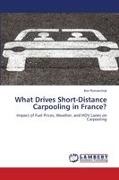Read more
France is one of the pioneers in terms of carpooling policies in Europe. High occupancy vehicle lanes have been introduced in routes towards various metropolitan areas, such asLille, Rennes, Strasbourg, Grenoble, allowing only the cars with 2 and more passengers to drive through. While there has been a plenty of research on the determinants of carpooling behavior from psychological,as well as several socio-economic factors, some areas remain unexplored, especially in relation to short-distance carpooling, under 80 km, in France. This research aims to establish the impact of fuel prices and precipitation, interacted with the presence of the HOV lanes on the number of carpooling trips focusing on the towngroups located on the road sections in 50 km vicinity to Rennes, Grenoble and Lille. The results of this research reveal the impacts of natural, economic and infrastructural factors on carpooling adoption in the contemporary EU context, which may serve as a policy guidance in the future.
About the author
Ihor Romanchuk, from Ukraine, holds a Master's degree in Applied Economics from the Vienna University of Economics and Business. His motivation for this book stemmed from contributing to a carpooling startup prototype for short-distance rural commuting, developed in a multinational team through the Erasmus+ co-financed "Urban Shift" programme.

